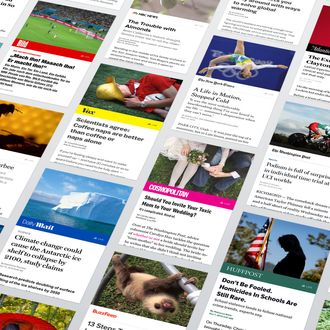
Good news for content creators: Facebook announced this week that it will soon roll out its Instant Articles platform to everyone.
Instant Articles, of course, are stories and articles and blog posts hosted on Facebook itself. Currently only available to a handful of institutional publishers — BuzzFeed, National Geographic, and the New York Times among them — Instant Articles theoretically improve a publication’s readership metrics simply by loading significantly faster. When a reader clicks through a link to an Instant Article on your Facebook feed — say, a Washington Post article — she’ll be taken to a minimally branded page that loads much more quickly than the article would on the Post’s own website. (For some perspective, 10 seconds qualifies as a long load time.) The Post keeps all revenue from advertising it sells itself on that article; extra inventory is sold on Facebook’s ad network at a 70/30 split between the Post and Facebook, respectively.
By opening up Instant Articles to everyone, Facebook is hoping to grow not only as a leading sourcing of web referral traffic, but as a first-party home to content itself. With Instant Articles, Facebook is offering publishers a 70 percent cut of ad revenue. And anyone can be a publisher. (New York’s Science of Us blog is a participant, “potentially with more of our sites to come,” I was informed.)
By offering some theoretical revenue to writers who might otherwise put their writing for free on another platform, Facebook hopes to attract more original content — and, BuzzFeed writes, undertake “an effort to bring more quality content to its platform, similar to the way YouTube’s revenue-share program is responsible for bringing talented creators to its site.”
This is an interesting comparison. Has YouTube’s revenue-share program really been responsible for bringing talented creators to its site? (Talented creators besides BuzzFeed’s enormous video operation, I mean.) There’s a very small class of extraordinarily successful vloggers, most of them appealing to a young audience. But there’s a larger middle class of vloggers and web series, whose struggles to break even, let alone profit, from their videos and series has been the subject of articles and profiles for years.
And there’s an enormous lumpen-proletariat class of mostly invisible channels made by people ripping clips from TV news, or uploading entire movies, or “freebooting” — stealing clips from Vine, YouTube, Instagram, or other channels and re-uploading them on their own channel.
Why wouldn’t Facebook’s Instant Articles end up the same way? Surely there is a handful of people with voices that will attract enough readers on Facebook to make a good living writing for it. And likely there will be a lot of writers who are currently posting for free to Twitter or Tumblr or Medium who might move to Facebook just to pick up the small amount of revenue it might provide them. And then there will be thousands of terrible pages simply copying and pasting news articles, listicles, humor pieces, and other highly shareable bits of fluff — run by the kind of people who recognize that for the amount of money you’re likely to make off of programmatic Facebook display ads, there’s little profit in writing original content.
In fact, we can get a kind of preview of the effect of open Instant Articles by looking at the way Facebook has tried to compete with YouTube — by providing better tools for hosting video on Facebook itself. (And by promoting Facebook-native videos more visibly.) It’s not pretty.
If we look at the current Facebook video economy as a precursor to Facebook’s text publishing economy, it’s easy to see it going not only off the rails but into the gutter. BuzzFeed (which is “all-in” on Instant Articles) lays out this scenario for freelancers (a.k.a. literally anyone):
Importantly, all Instant Articles need a web link as well, so someone participating couldn’t simply publish their work via Facebook only. They could, however, set up a simple website to stage the posts, and use Instant Articles as the primary distribution mechanism.
Tons of large new media operations produce cool and slick videos on Facebook, and the viewership numbers are skyrocketing! Also skyrocketing: Low-quality rips of poorly compressed videos originally upload to Instagram (themselves stolen from Vine). The freebooting world of Facebook is largely untamed, and one might assume, decently profitable as well. It’s not hard to imagine the same going for Instant Articles as well.
For a small set of successful professionals, Instant Articles could become a full-time source of income (possibly, in the beginning, subsidized and encouraged to post on Facebook … by Facebook). For existing media organizations, it calms them as to anxieties regarding . And for everyone else, it offers yet another way to share other people’s work and reap the benefit.
Update: This post has been updated to reflect that at least one New York vertical is on Instant Articles.





























